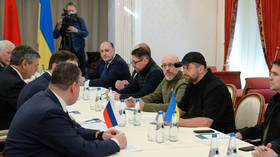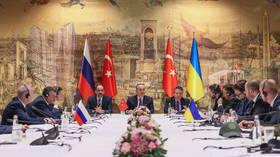Zelensky aide explains why Ukraine won’t negotiate with Russia

Ukraine has ruled out peace talks with Moscow under the existing circumstances, comparing any negotiations to “civilizational catastrophe.” Re-starting talks would not contribute anything to Kiev’s goals, Mikhail Podoliak, an aide to President Vladimir Zelensky, told Ukraine’s Babel news media outlet on Friday.
“Today, Ukraine has no motives to hold the talks,” Podoliak said, adding that the “opportunity to win this war is much more important than any situational pause.” Starting dialogue under the present circumstances would only “formalize” the defeat of Ukraine and that of Europe, as well as “European values,” he added.
Talks with Russia today will mean only one thing: Russia has won… Are you ready for that?
The presidential aide warned that Ukraine’s defeat would also mark the “collapse of the global security system and the system of democratic values.” Reaching a ceasefire now would not stop further conflicts, he said, adding that Russia might launch another attack on Ukraine at some point in the future.
Podoliak also compared the idea of starting peace talks with Moscow to conducting talks with Nazi Germany in 1942, when the Nazis occupied large swathes of Soviet territory, including all of Ukraine. “One cannot even imagine it. Any talks at that moment and with that [balance of power] would mean a civilizational catastrophe,” he said.
In early August, the Kremlin signaled its readiness to strike a peace deal with Kiev, while warning that it would achieve the goals of its military operation in Ukraine regardless of Kiev’s willingness to concede.
Kremlin spokesman Dmitry Peskov said at the time that the two nations were close to settling their differences in a way that was acceptable to Russia, but the draft agreement prepared during a meeting in Istanbul was torpedoed by Ukraine. Kiev broke off the talks with Moscow after accusing Russia of committing war crimes, an allegation that Russia said was based on fabricated evidence.
Former German Chancellor Gerhard Schroeder, who visited Moscow in early August, also said that a negotiated solution is possible and argued that the recent “initial success” of the grain export deal should be used to reach a ceasefire.
Russia sent troops into Ukraine on February 24, citing Kiev’s failure to implement the Minsk agreements, designed to give the regions of Donetsk and Lugansk special status within the Ukrainian state. The protocols, brokered by Germany and France, were first signed in 2014. Former Ukrainian President Pyotr Poroshenko has since admitted that Kiev’s main goal was to use the ceasefire to buy time and “create powerful armed forces.”
In February 2022, the Kremlin recognized the Donbass republics as independent states and demanded that Ukraine officially declare itself a neutral country that will never join any Western military bloc. Kiev insists the Russian offensive was completely unprovoked.













